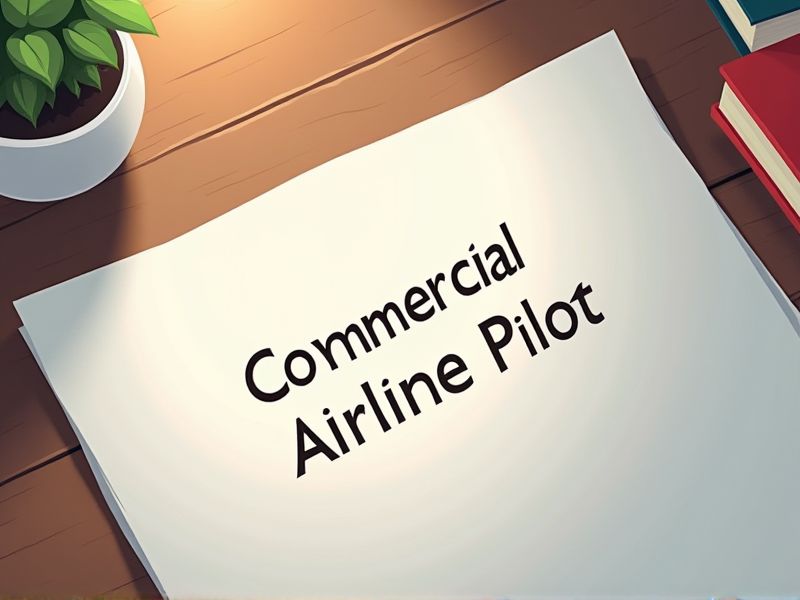
Becoming a commercial airline pilot requires specialized skills to ensure the safety of passengers and crew. Regulatory bodies mandate certain certifications to verify a pilot's ability to handle complex flight operations and respond effectively in emergency situations. Certifications also standardize pilot competencies across different airlines and countries, facilitating international aviation operations. Here are some important certifications required for a commercial airline pilot.
Private Pilot License (PPL)
Obtaining a Private Pilot License (PPL) provides foundational skills and knowledge essential for advanced pilot training. Commercial airline pilots must possess a comprehensive understanding of aviation fundamentals, which a PPL helps to cultivate. Regulatory requirements often mandate a PPL as a prerequisite for further commercial pilot training and licensing. Accumulating flight hours through a PPL builds critical experience needed for handling complex commercial aircraft.
Instrument Flight Rules Rating (IFR)
An IFR rating enables pilots to operate aircraft in a wider range of weather conditions, increasing flight safety and reliability. Commercial airline operations frequently involve flying through clouds and adverse weather; hence, IFR skills are essential. Pilots with IFR rating are equipped to navigate using instruments rather than visual cues, crucial in low-visibility scenarios. Regulatory bodies mandate IFR proficiency for commercial pilots to ensure adherence to safety standards and operational competence.
Commercial Pilot License (CPL)
A Commercial Pilot License (CPL) is essential because it legally certifies a pilot to operate aircraft for hire, ensuring compliance with aviation regulations. CPL training provides pilots with advanced knowledge and skills in navigation, meteorology, and aircraft control, crucial for the safety and efficiency of commercial flight operations. Airlines require CPL as proof of a pilot's competence to handle complex aircraft and manage in-flight emergencies. Obtaining a CPL typically involves completing a specified number of flight hours, further validating the pilot's experience and readiness for commercial responsibilities.
Multi-Engine Rating (MER)
Commercial airline pilots require a Multi-Engine Rating (MER) for enhanced safety, as it equips them with the skills to handle engine failures in complex aircraft. MER provides a crucial understanding of aerodynamic differences in multi-engine planes, ensuring better efficiency and control. Commercial airlines operate primarily multi-engine aircraft, necessitating pilots to be proficient in their operation and management. The industry standard mandates MER for pilots to ensure compliance with regulatory norms and enhance their prospects within the airline sector.
Airline Transport Pilot License (ATPL)
The Airline Transport Pilot License is necessary because it ensures the pilot has reached the highest level of aviation certification, which includes mastering complex procedures essential for commercial operations. This license mandates extensive training and experience, often requiring at least 1,500 flight hours, which enhances a pilot's decision-making skills and situational awareness. Regulatory bodies, including the Federal Aviation Administration, require ATPL for piloting commercial aircraft to maintain safety and consistency in the aviation industry. The ATPL requirement helps ensure passenger safety and confidence in the airline's operational reliability.
Type Rating Certification
A Type Rating Certification is essential for commercial airline pilots because it ensures they have the specialized training necessary to operate specific aircraft models safely. Different aircraft have unique systems and handling characteristics, making type-specific training crucial to mitigate potential operational risks. Regulatory bodies, like the FAA or EASA, mandate type ratings to uphold safety standards in commercial aviation. Airlines require pilots to have these certifications to ensure their ability to handle complex aircraft and emergency situations effectively.
Flight Instructor Certificate
A Flight Instructor Certificate enhances a commercial airline pilot's understanding of aviation principles by requiring them to teach others, which in turn, reinforces their own knowledge. Having this certificate often improves a pilot's proficiency in handling emergency situations by exposing them to potential scenarios during training. Many airlines view a Flight Instructor Certificate as a valuable asset, as it demonstrates a pilot's competence and commitment to continual learning. Acquiring this certificate can provide additional flight hours for a pilot, ensuring they meet the stringent experience requirements set by commercial airlines.
Crew Resource Management (CRM) Training Certification
Crew Resource Management (CRM) Training Certification is needed to enhance communication and teamwork among pilots, leading to safer flight operations. Studies have shown that human error is a significant factor in aviation accidents, and CRM training addresses decision-making and situational awareness to mitigate this risk. It equips pilots with skills in conflict resolution and stress management, crucial for handling high-pressure situations. Regulatory bodies like the FAA mandate CRM as it aligns with international standards and improves overall operational efficiency.
Safety Management Systems (SMS) Training Certification
Safety Management Systems (SMS) Training Certification equips commercial airline pilots with the knowledge to identify and mitigate potential risks, which directly enhances flight safety. Understanding SMS principles allows pilots to contribute effectively to airline safety culture and decision-making processes. The training typically results in improved communication and cooperation between cockpit crews and other operational personnel. Airlines that implement SMS training often experience fewer incidents, leading to increased passenger trust and potential financial benefits.
Class 1 Medical Certificate
Obtaining a Class 1 Medical Certificate is crucial for commercial airline pilots because it verifies that they meet the stringent health and fitness standards necessary to safely operate an aircraft. This certification covers evaluations of physical and mental health, ensuring pilots maintain optimal situational awareness and decision-making skills. The certificate also assesses cardiovascular health, vision, and hearing, which are critical for handling the demands of flying. Regular renewal of the certificate is required to monitor the pilot's ongoing ability to perform their duties without compromising safety.
Summary
When you achieve additional certifications as a commercial airline pilot, your career opportunities expand significantly. Increased qualifications often lead to higher earning potential and access to more prestigious airlines. The enhanced skills and knowledge from certifications can boost flight safety outcomes. Your professional reputation is likely to improve, positioning you as a valuable asset in the aviation industry.
